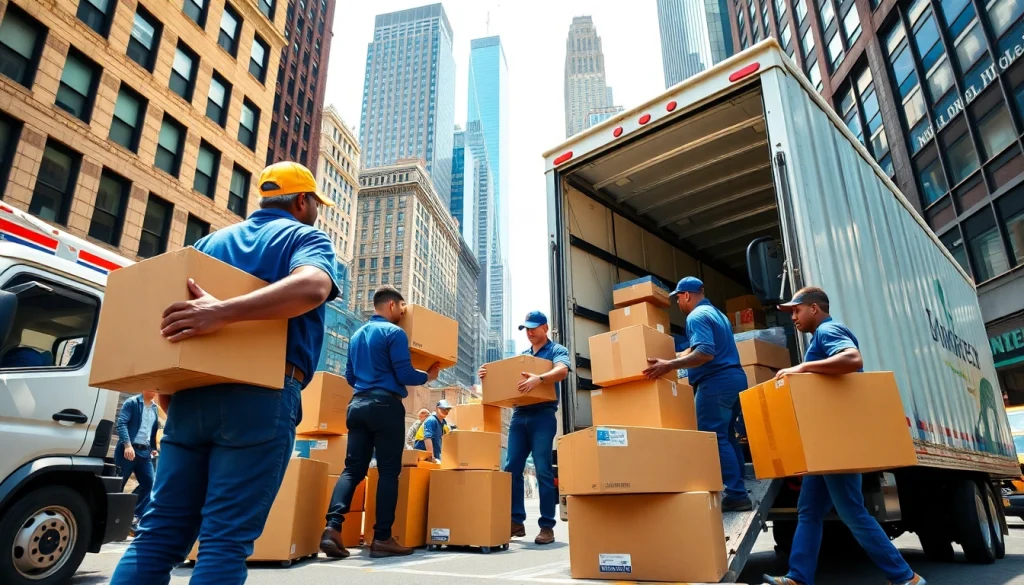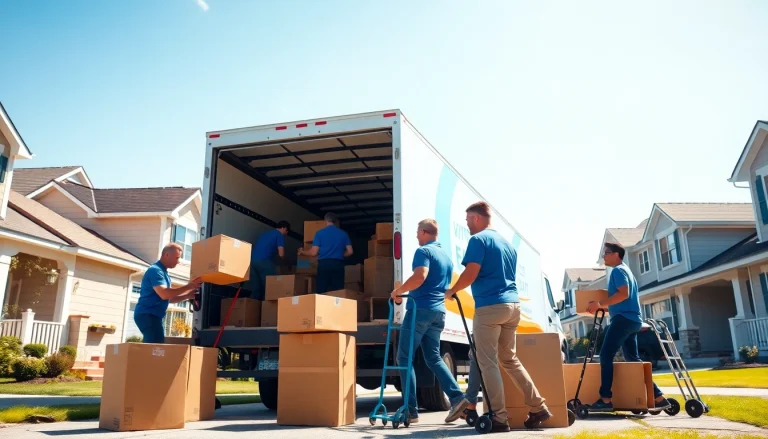
Understanding Your Moving Needs
Moving can be an exciting yet overwhelming experience, especially in a bustling city like New York. When planning your move, it’s vital to first understand your unique requirements. This includes assessing the type of move you are making, determining your budget, and setting a realistic timeline. By considering these factors, you ensure a smoother transition to your new home. In your quest for the Best movers nyc, keep these aspects in mind to tailor your search effectively.
Assessing Your Move Type
Before diving into the logistics of your move, it’s crucial to identify the type of move you are undertaking. Here are the most common types:
- Local Move: Typically occurs within the same city, often involving a short distance. This type of move is usually less stressful and more affordable.
- Long-Distance Move: Involves relocating across state lines or beyond. This type usually requires more planning and coordination.
- Commercial Move: Moving business premises, which may involve specialized equipment and arrangements to minimize downtime.
- International Move: A more complex endeavor that involves logistics across countries, often requiring customs clearance.
Identifying which type of move you are dealing with will help narrow down which movers in NYC specialize in your specific needs.
Determining Your Budget
Understanding your budget is a vital step to ensure your moving experience is under control financially. The costs for moving can vary considerably based on several factors, such as distance, volume of goods, and additional services included in your move (like packing, storage, or specialty items). Here’s how to manage and plan your budget:
- Inventory Your Items: Create a detailed inventory list of all the items you plan to move, which will significantly aid in estimating moving costs.
- Get Multiple Quotes: Different movers have varying pricing structures. Always gather quotes from at least three different moving companies.
- Factor in Additional Costs: Consider additional costs such as fees for packing materials, insurance, and potential storage fees.
By defining your budget early on, you set a guideline that helps prioritize and streamline your moving process.
Setting a Moving Timeline
The timeline influences every aspect of your move. Ideally, you should start planning your move at least two months in advance for local moves and even earlier for long-distance or international relocations. A practical timeline includes:
- 8 Weeks Prior: Start decluttering, decide on your moving type, and establish a preliminary budget.
- 6 Weeks Prior: Research moving companies and gather quotes. Make appointments for in-home estimates if necessary.
- 4 Weeks Prior: Confirm your moving date, hire your mover, and begin packing non-essential items.
- 1-2 Weeks Prior: Finish packing, notify utilities and change of address, and confirm details with your mover.
Having a detailed timeline helps you stay on track and reduces last-minute stress as moving day approaches.
Researching the Best Movers NYC
Once you have solidified your moving needs, the next step involves diligent research to find the best movers in NYC that align with those needs. In this competitive market, it’s essential to look for movers who not only fit within your budget but also hold a strong reputation for reliability and service.
Checking Reviews and Ratings
Consumer insights can be invaluable when selecting a moving company. Platforms like Yelp and Google Reviews provide real customer experiences. Look for movers who:
- Have high ratings across various platforms. Ideally, you should seek companies with ratings of 4 stars or above.
- Have recent reviews, as these provide a snapshot of current operations and service standards.
- Respond to negative reviews, showcasing their commitment to customer satisfaction and transparency.
Additionally, consider exploring community platforms such as Reddit, where individuals often share personal recommendations and experiences with local moving companies.
Comparing Services Offered
Different moving companies offer a variety of services beyond simple transportation. Evaluate what services are essential for your move, such as:
- Packing Services: Benefits include reducing your workload and ensuring items are securely packed.
- Storage Solutions: If your new place isn’t ready, storage options can be a lifesaver.
- Special Handling for Fragile Items: Ensure that your chosen mover has the expertise to handle valuable or delicate items.
Assessing your specific needs in conjunction with what services are offered will help you make the best choice.
Looking for Licensed Companies
Legitimacy is a critical factor in selecting your movers. Always ensure that your chosen moving company is:
- Licensed: Check for a valid USDOT number, indicating that the company is registered for interstate moves.
- Insured: This protects your belongings during the move and ensures you are compensated in the event of issues.
- Accredited: Look for affiliations with organizations like the Better Business Bureau (BBB), which implies industry standards and accountability.
Ensuring that your moving company is properly licensed can save you from potential inconveniences or scams.
Getting Quotes from Movers
Once you’ve narrowed your options, the next step is obtaining accurate quotes. This stage is critical for ensuring all costs are accounted for and helps prevent unpleasant surprises on moving day.
What to Include in Your Inquiry
When requesting quotes, provide detailed information to receive the most accurate estimates. This includes:
- The size of your home and the number of rooms.
- A complete inventory list of items to be moved.
- Any additional services you might require, such as packing and unpacking.
- Your preferred moving dates.
Providing thorough information helps movers give a realistic estimate of costs and services tailored to your needs.
Understanding Pricing Structures
Moving companies typically use different pricing structures that can include:
- Hourly Rates: Common for local moves where you pay a set price per hour plus additional charges based on the number of movers.
- Flat Rates: Predetermined price for the entire move, ideal for longer or more complex relocations.
- Weight-Based Pricing: Often used for long-distance moves based on the weight of your shipment and distance.
Understanding these different pricing structures helps to compare quotes effectively and ensures you are paying for necessary services.
Evaluating Insurance Options
Insurance for your belongings during the move is essential, as accidents can happen. Consider the following:
- Released Value Protection: Basic, no-cost option provided by moving companies which only covers a minimal amount per pound of damaged goods.
- Full Value Protection: More comprehensive, covering the full value of lost or damaged items, typically included for an additional fee.
- Third-Party Insurance: Consider an external policy for additional coverage which may include more extensive protections.
Choosing the right insurance option adds peace of mind for valuable and sentimental items during your move.
Planning for Moving Day
The day of the move can be chaotic, but with proper planning, you can make it as seamless as possible. Here, we highlight the essential steps to take when preparing for moving day.
Creating a Moving Checklist
Developing a comprehensive moving checklist will help you keep track of tasks and ensure nothing is overlooked. Key items to include are:
- Confirming the moving date and time with your mover.
- Finalizing packing and labeling all boxes.
- Ensuring utilities are disconnected and scheduled at your new place.
- Preparing any necessary travel plans on moving day, including parking permits or elevator reservations.
By checking off tasks as they are completed, you’ll maintain a sense of control over the organized chaos that moving tends to be.
Preparing Your Belongings
As moving day nears, focus on the last-minute preparations for your belongings:
- Finish Packing: Ensure all items, including fragile ones, are securely packed and labeled clearly.
- Prepare Essentials Box: Create a box containing items you’ll need immediately after the move (toiletries, initial food supplies, essential documents).
- Confirm Arrangements for Pets and Plants: Ensure that pets and delicate plants are accounted for during the move.
Caring for these particulars on the day of your move helps create a smoother migration to your new abode.
Communicating with Your Movers
Clear and effective communication with your moving team is vital on moving day. This includes:
- Providing clear access to your home and pointing out fragile areas.
- Doing a walk-through with the movers to confirm all your items are accounted for and understand exactly where you want items placed at your new location.
- Being available to answer questions or address concerns as they arise.
Open communication sets expectations and fosters a positive relationship with your moving team, contributing to an overall successful moving day.
Post-Move Considerations
Once the move is completed, it’s essential to follow up with several considerations to finalize the process and ensure your belongings are in order.
Unpacking Efficiently
Unpacking can often feel overwhelming. To manage it effectively:
- Prioritize Areas: Start with essential rooms like the kitchen and bedrooms, then move on to other spaces.
- Keep a Checklist: Reference your inventory list to ensure everything has arrived and unpack as you go.
- Establish Zones: Assign spaces for different categories of items to streamline the unpacking process and maintain organization.
This organized method will alleviate feelings of being overwhelmed during unpacking and help you settle in more comfortably.
Making Sure Everything Arrives Safely
Conduct a thorough inspection of your items as you unpack:
- Check each box against your inventory for damages or lost items.
- Document any issues and communicate them immediately to your moving company for possible claims.
- Keep all paperwork related to the move organized, which will assist with any logistical follow-ups or claims.
Essential follow-up steps will help ensure that your transition is complete without lingering issues.
Leaving Reviews for Your Movers
Once your move has concluded and you settle into your new home, consider leaving a review:
- Be detailed about your experience to provide value to others reading your review.
- Highlight specific aspects that stood out, whether positive or negative, to give future movers insight into what to expect.
- Your reviews help the moving company improve and can assist other customers in making informed decisions.
Your feedback can significantly impact the moving community by guiding others toward their ideal moving experience.





